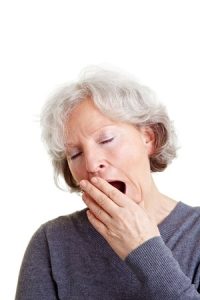Do you or your clients have difficulty falling asleep (30-45 minutes)? Once asleep, do they wake frequently and have trouble returning to sleep? Do you wake up too early in the morning? Are you experiencing unrefreshing sleep? Lots of people suffer from bad sleep habits. But there are a number of things you can do to change this.

- Regular exercise does more than keep you fit. It also helps your body fall into a deeper sleep. Be warned, vigorous exercise just before sleep can have the reverse effect. If you want your exercise to benefit your sleep, exercise in the afternoon.
- The benefits of powernaps are slowly but surely making their way to the surface. The best time of day to take a nap is between 1 and 3 PM. This is because your body experiences a dip in body temperature during this time. The same kind of temperature dip that makes you feel sleepy at night. Experts say 20 minutes and 90 minutes are the strict lengths for effective naps. If you wake yourself up in between these times or after 90, you will be waking up in the middle of a sleep cycle. You will most likely wake up feeling more tired or groggy.
- Certain bedtime snacks can help you fall asleep and sleep better. If your blood sugar drops during sleep, your serum cortisol level will rise, and this is a hormone that promotes activity in the body. If you have a snack at bedtime containing complex carbohydrates and protein, the nutrients will sustain your body through the night. Foods like bananas, potatoes, oatmeal, whole-wheat bread, turkey and warm milk are great bedtime snacks.
- Avoid alcohol and caffeine near bedtime. Caffeine, obviously, is a stimulant. Although it may temporarily sedate you, alcohol turns to sugar in your blood. When your blood sugar level drops quickly, you will awaken feeling agitated.
- Having a regular sleep schedule makes for better rest. Try to go to sleep at the same time, but only if you are tired. Don’t lie there brooding about being awake. Drink the warm milk, eat a banana and find a cozy place to read, sew or something else relaxing.
- Resist the urge to turn on the TV or grab your smartphone or tablet. Consuming electronic media just before bedtime makes for lower-quality sleep. Even if you get as much sleep as those who don’t use any light-emitting device before bed. The exposure to light stimulates the brain and creates a false alertness and stimulation.
Give these tips to those clients of yours that exhibit some of these negative sleeping habits. And the same goes for you. If you are not experiencing your best sleep, you aren’t experiencing your best life. Let us know how they work for your!

